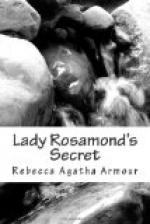Sir Thomas was persuaded to remain to luncheon. The party consisted of the family, Sir Thomas, and Colonel Trevelyan, a gentleman whose acquaintance Lord Bereford formed while visiting an old friend. The conversation was friendly and animated. Many topics of general interest afforded them an opportunity to pass the hours in a pleasant, lively and genial manner. Having by accident referred to his connection with the Peninsula campaign, Lord Bereford was delighted to find another intimate friend of Sir Howard Douglas. Sir Thomas Seymour joined heartily in the general discourse. Colonel Trevelyan, or properly speaking Sir Guy Trevelyan, told many incidents of military and social life, in which Sir Howard and himself had figured quite conspicuously.
Great was Maude Bereford’s delight when she learned that the young officer, so often alluded to in the letters received from Mary Douglas, was the son of their guest. At this intelligence a sudden frown rested on Lady Bereford’s brow, but momentarily vanished. She had gained her point; such matters did not so forcibly affect her now. Naturally many inquiries were made respecting the young lieutenant, all of which were answered in a quiet and unassuming way. The character of the father betrayed that of his son. Without questioning why Maude Bereford felt a deep interest in the young unknown, she had already been forming plans of inquiry to ascertain a further knowledge. Lady Rosamond would certainly be able to give her a correct description. Certainly her ladyship must spend much time in the company of one who had such claims on the friendship of Sir Howard. Reasoning thus was the gentle daughter of Lady Bereford, while the latter was exultant in having formed a plan for the furtherance of a scheme which lay near her heart.
The next morning her ladyship was alone in her boudoir. A delicately folded sheet lay upon the exquisitely inlaid writing desk before her. Satisfaction beams upon her by occasional smiles. Again she seizes the unclosed letter, examines closely its contents, and, with evident ease, places it in an envelope which she seals and addresses. A servant in livery answers the summons of a silver bell standing beside the desk. Her ladyship, drawing aside a hanging of silver tissue, approaches the door where the missive is delivered in charge of the liveried attendant. With a sense of relief Lady Bereford returns to the library to await the morning mail.
Lady Bereford indeed lavished all the fondness of a mother’s pride upon her first-born. Maude was to her a simple-minded, gentle girl, whose sole influence was her mother’s will. The daughter of Lord Bereford was a true type of her father: gentle, conscientious and sympathetic.




